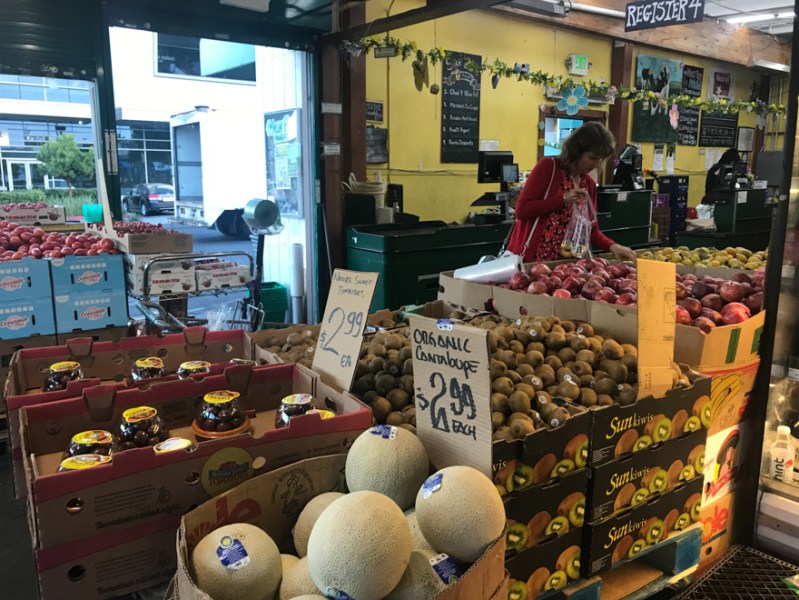As internship recruiting season gets underway, Stanford’s many tech hopefuls will have to consider an unusual policy at Facebook’s soon-to-open Mountain View office space: no fully-subsidized cafeterias will be allowed in the office.
The offices, which will house about 2,000 employees and are due to open in late 2018, are part of the San Antonio Center, a mixed-use development on the corner of El Camino and Showers Drive that encompasses office space, restaurants, retail stores and apartments. The City of Mountain View’s decision to curb corporate cafeterias in this space represents an effort to protect San Antonio Center restaurants, who would face steep competition with the renowned gourmet food Facebook offers its employees for free.
“This was our way of making sure that these restaurants have demand during all the peak times that they need to survive financially,” said Chris Clark ’05, a member of Mountain View City Council who served as mayor in 2014. “The housing [at the San Antonio Center] supports them, giving them an evening crowd and a weekend crowd, but that alone won’t be enough to support them if they don’t have any daytime traffic.”
Shonda Ranson, the communications coordinator for the city of Mountain View, clarified that the corporate cafeteria ban was not a city-wide policy; rather, it was implemented as part of the recent redevelopment for the San Antonio Center in particular. She expressed hope that the San Antonio Center’s location and design would make the policy easier for Facebook employees to navigate.
“[The San Antonio Center] is right next to a train station — there’s no reason for people to even bring cars in the area and no reason to have to leave the complex to get food,” Ranson said. “It was designed in a very specific way to reduce traffic and to make the neighborhood successful and appealing for people who live and work there.”
According to a survey conducted by Bridging Education Ambition and Meaningful Work (BEAM) in 2017, almost 20 percent of Stanford graduates go into computer science roles, with giants like Facebook, Google and Microsoft topping the list of destinations. Companies like these, in their effort to recruit the best newly-minted tech talent, have made fancy and fully subsidized meals the new normal in Silicon Valley — Dropbox’s free cafeteria even employs chefs with experience at Michelin-starred restaurants.
Clark, who also serves as the Chief Operating Officer at the San Francisco based artificial intelligence company OpenAI, was understanding of the steep labor market competition that tech companies face and how much perks like free food can help attract talent. He voted against the cafeteria provision, though he says he “certainly saw the concerns” of his fellow councilmembers.
“At my day job… we feed our employees for free, twice a day,” Clark said. “It makes it really difficult to compete in a marketplace if you don’t offer free food.”
According to Clark, there is some flexibility in the San Antonio Center policy, and Facebook will be allowed to propose an alternate solution to balance the needs of the local businesses with its culture of employee benefits. He said that he expects Facebook to propose a “hybrid” structure, such as vouchers to local restaurants or opening the cafeteria to the public.
Harrison expressed Facebook’s intent to maintain an open dialogue with the City of Mountain View to come to a mutually beneficial solution.
“We are committed to being a good neighbor, and remaining respectful and mindful of how we approach our expansion,” he said. “We’re working hard to develop a community friendly and viable food service option for the Mountain View office.”
Though Mountain View is the first Silicon Valley city to limit subsidized corporate food, other municipalities may follow close behind. Over the summer, San Francisco Supervisors Aaron Peskin and Ahsha Safaí proposed a city-wide ban on new construction of new employee cafeterias, fueling the ongoing tension between small, local businesses and the the city’s burgeoning tech industry.
Clark worried that San Francisco’s proposed policy could produce too much backlash from the tech industry to be worthwhile, instead advocating that cities follow Mountain View’s case-by-case approach to regulation.
“If there is a particular area where there are significant issues retaining restaurants, maybe [cities] can come up with a provision for that specific area, and work with the developer just like we did,” Clark said. “But an outright city-wide ban will backfire.”
Many of the restaurants in the San Antonio Center are starting to create plans to market to the new Facebook employees in the complex, according to Ranson. She said that the Milk Pail Market, an independent grocery store that had been at risk of going out of business during the Center’s redevelopment project, was in talks with Facebook about creating prepackaged meals geared toward employees looking for a quick midday bite.
“A lot of small, independent restaurants had been impacted when some of these companies went in-house with their food offerings,” Steve Rasmussen, the owner of Milk Pail Market, told The San Francisco Chronicle this summer. “I think collaboration is vital, and it makes total sense.”
This article has been updated. A previous version inaccurately stated that Chris Clark was the Chief Operating Officer at Y Combinator, instead of at OpenAI. The Daily regrets this error.
Contact Katie Keller at ktkeller ‘at’ stanford.edu.
